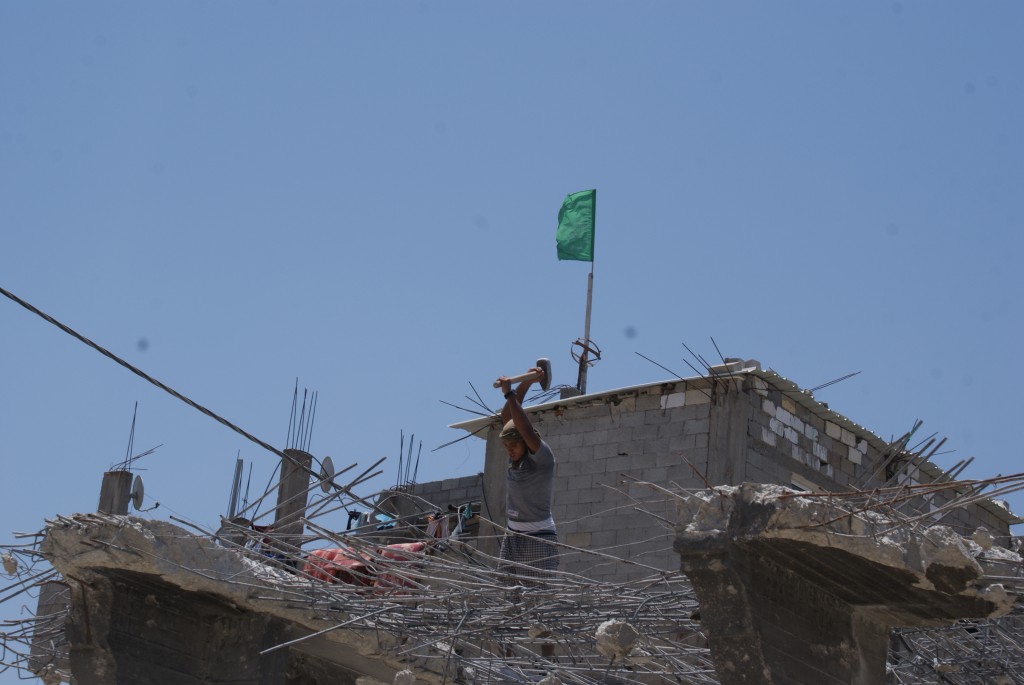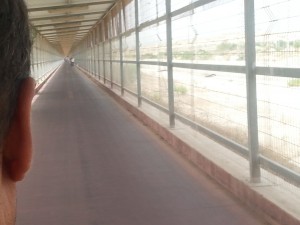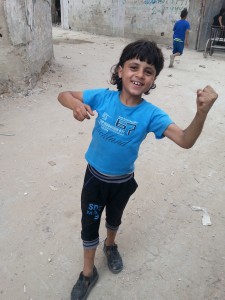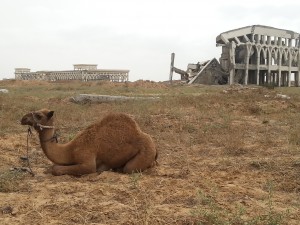One year on: Gaza’s hidden psychological ruins
By Khaled Diab
It is not just the landscape that is scarred and devastated, Gaza is an emotional and mental wreck teetering on the verge of psychological ruin.

Wednesday 8 July 2015

Entering Gaza feels a little like infiltrating the world's largest maximum security facility, home to 1.8 million inmates, living on 360 km² of land.
On the Israeli side of the high wall surrounding the imposing Erez crossing, there is a large field of magnificent sunflowers, which looks out of place in these bleak surroundings.
Small, impoverished, overcrowded and trapped between the deep blue sea and the Israeli-Egyptian blockade, Gaza is a stifling and suffocating place. Already confronted with a severe housing shortage before the Israeli military offensive in 2014, the displaced live in whatever available spaces there are: UNRWA schools, tents, heat-intensifying tinplate or zinc containers, with extended family and even in damaged buildings.
With reconstruction work stalled for lack of materials and funds, the deep scars left on the landscape by last summer's brutal war have not even begun to heal. Almost everywhere you go, the remains and ruins of war are visible, even in Gaza city's only upmarket neighbourhood, al-Rimal.

Shuja'iyya, which was flattened by Israeli forces and became an icon of the war, is still largely a rubble-strewn crater, where the skeleton of the odd building still stands drunkenly like a fallen house of cards. Bulldozers slowly remove the traces of destruction and young children play in the newly vacated spaces, asking us to take their photos.
Given the many rounds of destruction Gaza has endured, there is a sort of geology of devastation. The oldest artefact is the short-lived but once-gleaming Yasser Arafat International Airport. But like Palestinian dreams of freedom and independence, its Andalusian arches lie in ruins. Now a grazing ground for camels, this locked gateway to the world is a poignant symbol of Gaza's current siege.
However, it is not just the landscape and architecture that are scarred and devastated, psychologically, Gaza is an emotional and mental wreck. “There is a high level of psychological pressure in the Gaza strip,” Hasan Zeyada, a veteran psychologist at the pioneering Gaza Community Mental Health Programme (GCMHP), told me.

On the surface, Gazans exhibit remarkable fortitude. But scratch a little deeper beneath the smiling, welcoming facades and you quickly find bubbling despair and overwhelming distress afflicting every segment of society. “This is no life. No-one cares about us,” confessed Samer, a teenager forced to collect and sell rubble to help his now-homeless family.
With large families the norm, people seek whatever escape they can. Gaza's teeming beaches are popular day and night, even in areas where raw sewage flows straight into the sea. “We go to sleep, we wake up, we take walks on the beach – we fill the time,” says unemployed graduate Saleh Ashour, 24, describing a typical day.
Everywhere you turn, there are many, many children, but few genuine childhoods are visible. With the exception of flashy, brightly lit toy cars on the beach promenade and a few makeshift football pitches, there is little in the way of child's play, but a rising amount of child labour. And these poor young souls, who make up the majority of Gaza's population, are the most vulnerable psychologically. “Children are the most sensitive group and they are the most likely to be affected by the socio-political reality,” explains Zeyada.

And the trauma some have endured could buckle the toughest adult's shoulders. Take Reda, 15, who lost her mother, a number of siblings and members of her extended family during an Israeli airstrike. Now she must care for her father and surviving siblings, while clinging desperately on to the memory of her mother. “My mum was my friend… I feel that she is talking to me,” the girl, who has shed 8kg since then, her appetite drained by dreams of eating the pizza her mother was preparing when disaster struck, told al-Mizan, a Gaza-based human rights organisation.
The trauma of loss has been tough on the adult population too. “I lost Arwa, the apple of my heart,” confesses Hamida, whose favourite niece perished with 18 other members of her family. “When I used to visit her, her smile would precede her and she would open her arms wide to hug me… Her drawings were so beautiful. I wish one had survived.”
But it is not just the trauma of war and the loss of loved ones which afflicts Gaza's adult population. With unemployment at 44% (60% for youth), GDP at a quarter of what it would be without the blockade and real per-capita income a fifth of what it was two decades ago, according to the World Bank, the psychological impact of Gaza's prolonged isolation is immense.
“The whole of life in Gaza is in a state of deterioration. There is no stability for anyone,” describes Hasan Zeyada.
“Gaza has endured multiple losses, what we call multi-traumatic losses,” elaborates Zeyada, who became the patient as well as the doctor when he lost his mother and five other close family members during an Israeli airstrike. “People in other places usually endure a single loss: the loss of a home, or a family member, or a job. Many Gazans have lost them all.”
This prolonged and continuing stress and trauma have resulted in a growing plethora of psychological difficulties. These include low self-esteem, self-blame, displacement of anger, anxiety, panic attacks, obsessive compulsive disorders, mood swings and full blown depression.
Displaced feelings of anger and frustration have also led to a growing level of domestic violence and more aggressive public behaviour, notes Zeyada.
“I'm sitting around, and this guy's sitting around, and that guy. We've all had it up to here,” says Saleh Ashour. “If someone comes and cracks a joke with me, I find I get all serious with him.”
Faced with this economic, social and psychological wasteland, large swathes of Gazan society are possessed with the overwhelming urge to take flight and escape. “If they open up the crossing and give us opportunities to emigrate, not a single young person would remain in Gaza, not even those with jobs,” said unemployed graduate Amer Teemah, 24. And true enough, even successful Gazan academics and journalists I met want to leave, temporarily, they say, but they fear they may decide never to return.
Teeman and his lifelong friend, Ashour, paid $3,500 each to smugglers to get them to Europe, but failed.
“You are condemned to be a failure before you can even start,” says a crest-fallen Teemah, who has no clue what to do now that his outlandish plans to build a new life in another land have failed, and only landed him in debt.
Despite the immense emotional and psychological strain, Gazans are remarkably tough and resilient survivors. Thousands continue to work, despite not having received a salary in months, and there is an air of relative law and order, considering the dire circumstances.
But if the status quo continues, Gaza faces the prospect of total psychological ruin, with unforeseeable consequences. Ultimately, Gaza's psychological and emotional malaise is of an entirely manmade nature. “Many of the psychological problems in Gaza are reactive. They are a reaction to the present situation,” observes Hasan Zeyada. “That means that mental health in Gaza is connected to the political reality.”
Gaza's cure lies in Israel and Egypt's hands, who need to urgently seek counselling regarding their irrational paranoia towards the Strip. Catastrophe can be averted if the blockade is lifted, which will provide the Gazan population with what it desperately misses the most: hope for the future.
____
Follow Khaled Diab on Twitter.
This is the extended version of an article which first appeared in The National on 13 June 2015.


Powerful, emotive piece on Gaza
Excellent article…and heartbreaking.